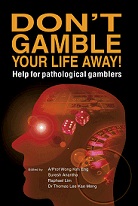When gambling becomes a problem
The elderly are one of the high-risk population groups for developing a gambling problem, which can lead to financial issues and other serious social consequences. Some insights about the problem from a psychologist.
BY: Lawrence Tan
 While gambling is a recreational activity enjoyed by many, it has also proven to be a devastating problem when a person crosses the line from social to problem or pathological gambling. An Ministry of Community Development, Youth and Sports’ (MCYS) survey conducted in 2008 indicated that 54 percent of Singaporeans participated in at least one form of gambling activity in the last 12 months with 1.2 percent of the survey respondents were assessed to be probable pathological gamblers. Among the various age groups surveyed, 1.7 of those aged 50 to 59 and 0.9 percent of those aged above 60 were found to be probable pathological gamblers.
While gambling is a recreational activity enjoyed by many, it has also proven to be a devastating problem when a person crosses the line from social to problem or pathological gambling. An Ministry of Community Development, Youth and Sports’ (MCYS) survey conducted in 2008 indicated that 54 percent of Singaporeans participated in at least one form of gambling activity in the last 12 months with 1.2 percent of the survey respondents were assessed to be probable pathological gamblers. Among the various age groups surveyed, 1.7 of those aged 50 to 59 and 0.9 percent of those aged above 60 were found to be probable pathological gamblers.
The problem escalates
Based on the MCYS survey, while the number of elderly gamblers may not seem startling, it is worthwhile to note that gambling among the elderly can seriously compromise one’s quality of life in various aspects including mental and physical health, family relationships, legal complications, financial issues, etc.
Among the elderly gamblers who have somewhat crossed that line between social and problem gambling, it was observed that gambling became an activity that quickly spiraled out of control within a short period of time. Many studies have identified certain risk factors that predispose the elderly to the risk of developing a gambling problem. Research has also shown that elderly gamblers tend to have a higher frequency of play than younger gamblers due to certain risk factors. Some risk factors relatively unique to elderly gamblers are:
• Disposable time – Many elderly gamblers are retirees who do have more time to gamble as compared to other age groups. This allows them to spend more time in gambling venues, which in turn increases the risk of them spending more time and money than intended on gambling.
• Loss of traditional roles – As people transit from middle age to old age, it is common for them to start losing their traditional roles (e.g. being a husband/wife, parent, employee, breadwinner, etc). This could in turn lead to existential issues like the loss of purpose and meaning in life. Such losses, if not managed properly, could even result in social isolation and emotional disturbance (e.g. anger, grief, anxiety, depression or boredom). In such situations, gambling could be particularly appealing as they provide an avenue for escape from painful or disturbing emotions that can be difficult to come to terms with.
• Loneliness and meaninglessness – Gambling can offer a much-needed relief from loneliness and meaninglessness because it provides entertainment and also presents opportunities for the elderly to socialise and to bridge the gulf of social isolation.
• Disposable money – Along with the loss of traditional roles and responsibilities comes the reduction of financial responsibilities. This often leaves many elderly gamblers with greater sums of disposable money to gamble with.
• Cognitive decline – Ageing can often be accompanied by gradual cognitive decline and disorders such as dementia. These can make elderly gamblers more vulnerable to developing problem gambling as these disorders are known to bring about an increase in impulsive behaviours and a reduction in the capacity to make sound decisions, exercise good judgment, weigh risks and remember past losses.
The consequences
Besides the risk factors mentioned above, the consequences faced by elderly gamblers as a result of problem or pathological gambling can also be rather different. For one, the elderly usually experiences more difficulties recovering from financial losses incurred in gambling, as they are likely to be unemployed and tend to face a higher risk of exhausting all their assets. Identifying the elderly at risk at an early stage could also be difficult because of their tendency to isolate themselves from family, friends and available resources they can tap on (e.g. NAMS, Credit Counselling Singapore, family service centres, Samaritans of Singapore (SOS), etc).
Research has also shown that when gambling becomes a problem, the elderly experience higher rates of mental health disturbances (e.g. depression, suicidal tendencies, etc) as compared to their younger counterparts.
Within the Asian context, the public is generally more accepting of gambling among the elderly because they see it as a normal recreational activity that may help them maintain a certain degree of healthy social contact and mental agility. Some possible reasons why many family members seem more willing to condone gambling behaviour among the elderly even it becomes problematic include:
• Respect for the elderly (filial piety).
• The belief that it is time for them to let go and enjoy themselves because they have worked hard all their lives.
• Family members feel obligated to bail the elderly out from their financial debt unconditionally.
• Feeling that they do not have a say in the decisions made by the elderly member of the family, especially when he/she is gambling with his/her own money.
Finding help
Given the various risk factors and difficulties experienced by elderly gamblers, one might be curious to find out how to better engage them when gambling becomes problematic to them. It is usually a lot more effective to first acknowledge their accomplishments and contributions to the society and family in the past, and to assure them that it is perfectly fine for them to enjoy and celebrate life after having worked hard for many years. It would then be helpful to highlight the fact that while gambling has been an enjoyable activity for them, the concern is whether that activity is starting to hurt them and destroy the kind of life they deserve to lead.
Family members or friends of elderly problem gamblers (or gamblers in general) can encourage their loved one to seek professional help such as the National Addictions Management Service (NAMS), an addiction treatment centre within the Institute of Mental Health (IMH). Pathological gambling is one of the many addictive disorders managed by the multi-disciplinary team of psychiatrists, counsellors, psychologists, medical social workers, and nurses in NAMS. The team provides medical, psychological as well as social interventions to the help-seeking individual as well as his/her family members.
If you know someone who has a gambling problem, please do not hesitate to seek professional help or call the National Problem Gambling Help line at 1800-6-668-668 to speak to a trained counsellor.
A CASE STUDY:
Mdm X is a 65-year-old housewife who was brought into treatment by her daughter. According to Mdm X, she has incurred a total debt of S$150,000 from her two years of gambling in floating casinos. She added that she was introduced to the game by her ex-colleagues who, like her, felt that life was boring and meaningless after retirement. She mentioned that she won a few thousand dollars in her first few visits, and felt a sense of accomplishment and control over her life.
She also verbalised that gambling seemed to take away the monotony of life and her loneliness. Within a short span of time, Mdm X began to lose more and more money to the floating casinos and was soon exhausting her savings and charging her credit cards up to the maximum credit limit. According to her, it came to a point where she felt that she just needed to be in the casinos playing the games regardless of whether she had money or not. Mdm X mentioned that winning or losing soon became unimportant and her primary concern for her was to be able to stay in the venue for as long as possible.
The story of Mdm X depicts the experience of many elderly problem gamblers who gamble as a way to deal with boredom, loneliness, meaninglessness and the perception of the gradual loss of control in life. The gambling activity appeared to serve specific functions in Mdm X’s life and one of the emphases of treatment and recovery was to help Mdm X fulfil those needs in a healthy and functional way.
 ** NAMS has published a useful book on pathological gambling called “Don’t Gamble Your Life Away! Help for Pathological Gamblers”. It is the first local book written for both professionals and laypersons. The book discusses various topics related to pathological gambling, including the current gambling landscape in Singapore, understanding pathological gambling and its etiology, treatment approaches, impact on families, community resources, and other useful information.
** NAMS has published a useful book on pathological gambling called “Don’t Gamble Your Life Away! Help for Pathological Gamblers”. It is the first local book written for both professionals and laypersons. The book discusses various topics related to pathological gambling, including the current gambling landscape in Singapore, understanding pathological gambling and its etiology, treatment approaches, impact on families, community resources, and other useful information.
It can be purchased at a special discounted price of S$20 from IMH – please contact NAMS at 6389 3660, or the Mental Health Education department at 6389 2831/2832. The book is also available from major bookstores in Singapore at the recommended retail price of S$25 (before GST).
Lawrence Tan is a psychologist at the Institute of Mental Health’s National Addictions Management Service (NAMS).

0 Comments